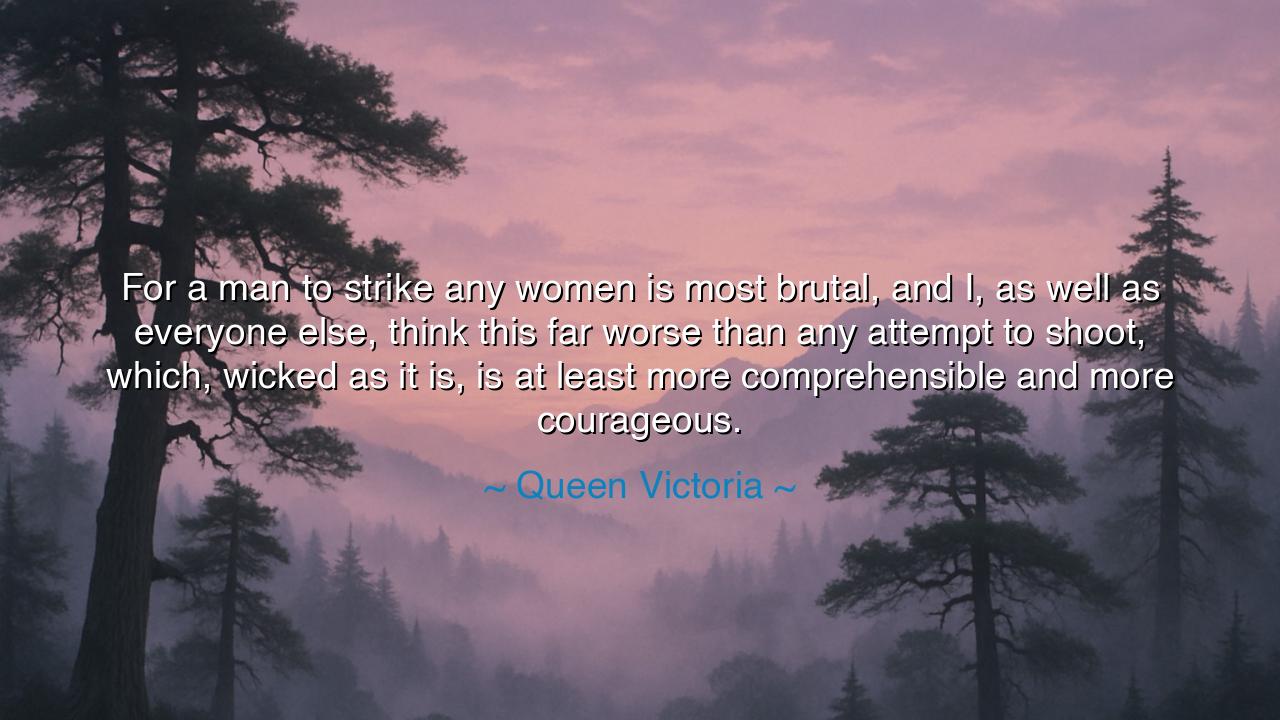
For a man to strike any women is most brutal, and I, as well as
For a man to strike any women is most brutal, and I, as well as everyone else, think this far worse than any attempt to shoot, which, wicked as it is, is at least more comprehensible and more courageous.






The words of Queen Victoria, "For a man to strike any woman is most brutal, and I, as well as everyone else, think this far worse than any attempt to shoot, which, wicked as it is, is at least more comprehensible and more courageous," resound as a cry from the throne to the conscience of all generations. In them is a declaration that the hand raised in violence against the weaker is the vilest form of cowardice, a deed not born of strength, but of depravity. For even in the chaos of war and the madness of assassination, there lies a twisted form of honor, but in the striking of a woman, there is none.
This truth is as old as time. In the sagas of ancient Greece, heroes were judged not only by the foes they slew, but by the reverence with which they treated those who bore life. When Hector bade farewell to Andromache, he did not raise his hand in cruelty, but shielded her with his love, though he went forth to meet death. The warrior’s honor was measured in battle, never in the domination of the defenseless. To strike a woman would have been a stain darker than defeat.
Consider, too, the chivalric code of the Middle Ages, which, though flawed, proclaimed one noble truth: that knights must protect the weak and uphold the dignity of women. Though many failed in practice, the very existence of such a code reveals that humanity has long known this: the measure of a man is not in his might, but in the way he wields his strength. To use it against those with less power is to forfeit all claim to honor.
Queen Victoria’s words come not merely from a monarch, but from one who saw the turbulence of her age—assassination attempts upon her very life. And yet she judged that the dagger or the bullet, though wicked, bore at least the shadow of courage, for they risked the assailant’s life. But the hand that beats a woman risks nothing but reveals everything—that within it lies not valor, but rot.
Let this teaching be carried as fire to the generations that follow: that the true courage of a man is not shown in his power to wound, but in his power to restrain, to protect, and to honor. He who strikes the defenseless is the lowest of cowards, and his name will be spat upon in the memory of the just. But he who lifts others up, who defends rather than destroys, will be remembered as a guardian of dignity, as one who bore the true weight of manhood with honor.






HQHoang Quynh
This quote from Queen Victoria touches on the cultural and moral values of her time, where violence against women was seen as particularly grievous. However, her comparison of violence against women to other forms of violence raises questions: Does this suggest a hierarchy of violence, where the victim's gender determines the severity of the act? How can we ensure that the conversation around violence becomes more inclusive, focusing on the wrongness of violence in all its forms?
MKMong Kieu
Queen Victoria’s comment about violence against women being worse than an attempt to shoot someone reveals a deeply protective and gendered view of women in the 19th century. In modern times, is this distinction still relevant, or does it reflect a paternalistic view that needs to be reconsidered? How can we make sure that violence against all people, regardless of gender, is equally condemned and recognized as unjust?
PBNguyen Phuoc Bao
The quote from Queen Victoria makes me wonder how our perceptions of violence have evolved. While it’s true that violence against women has historically been viewed as particularly heinous, does this view still hold up in the context of modern discussions about violence? Are we more focused now on condemning all forms of violence equally, or do we still have a tendency to view certain types of violence as more ‘comprehensible’ than others?
VTTran Viet Trung
Queen Victoria’s perspective on violence against women highlights the deeply ingrained gender norms of her time. Her remark about the brutality of a man striking a woman reflects a protective attitude, but does this same attitude contribute to the idea that women are more vulnerable or delicate than men? How can we challenge these outdated views and promote equality in our approach to all forms of violence, regardless of gender?
TTUyen Nguyen thi thu
Queen Victoria’s comment raises an interesting point about the perception of violence. While she’s right that striking a woman is considered a particularly brutal act, it also seems to suggest a certain dichotomy in how we view violence—where some acts are deemed more ‘comprehensible’ or ‘courageous’ than others. Does this imply that certain violent acts are more understandable or acceptable? How can we shift the conversation to a universal condemnation of all violence, regardless of the gender of the victim?